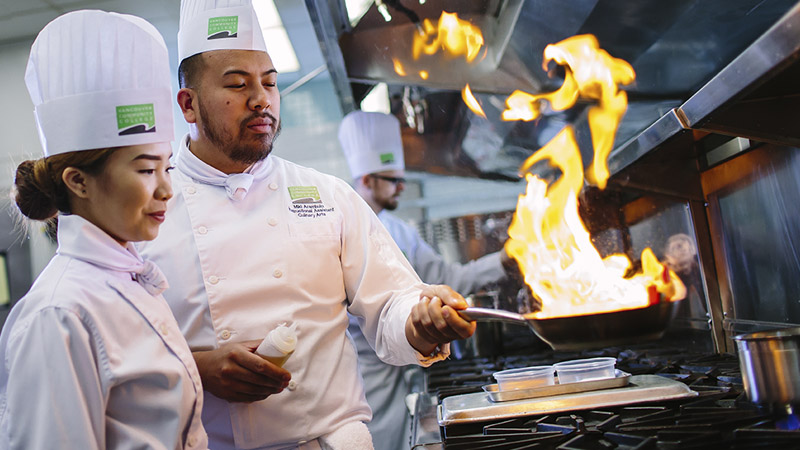

Learn the skills and techniques of professional commercial cooking from Canada's top chefs in a fully equipped industrial kitchen.
Culinary Arts and Food Service Management
What you will learn
Upon successful completion of this program, graduates will be able to:
- Apply cookery skills and theoretical knowledge to the preparation, presentation, and service of a range of dishes and beverages for the culinary, hospitality, and food service industries.
- Evaluate products, including raw and prepared products, for consistency and accuracy in yield, flavor, texture, and overall appearance according to product specifications and standards.
- Apply principles of human nutrition to develop balanced and nutritious menus and adapt menus, and products to specific dietary needs.
- Apply the principles of efficient food service systems tailored to the needs of various institutional settings.
- Adhere to industry health, safety, sanitation, and employment standards in the preparation, handling, and storage of food and equipment.
- Adapt the knowledge, skills and attitudes necessary for success and sustainable professional practice in the food service industry.
- Reflect on performance and practice to identify and develop advanced professional skills needed to further advance in the culinary, hospitality, and food service industries.
What to expect
Program Duration and Maximum Time for Completion
The program is 17 months. Students have a maximum of four years to complete the diploma.
The Culinary Arts and Food Service Management Diploma focuses on practical skill development and is delivered primarily in VCC kitchens and food service outlets. Students spend a minimum of one month in each of the teaching kitchens and service outlets where instructional activities include demonstration, hands-on practice, and group discussion. Culinary, management, and nutritional theory is taught in a classroom setting and uses a combination of lectures, class discussions, and independent study to promote the development of professional practice in the food industry.
The program is delivered in fully operational industrial kitchens, food service outlets, and classroom settings. Classroom instruction is designed for students to develop theoretical knowledge and the technical skills required for success in the food service industry.
The program design is based on a learning-centered learning-centred and experiential approach whereby students learn through experience in authentic work settings. Active student learning and participation are emphasized to promote the development of knowledge, skills, and attitudes required for success in the food service industry. Professional skills, such as teamwork, critical thinking, self-reflection, self-reflection, and communication, are also emphasized throughout the program.
Theoretical assignments, and project submissions occur on Moodle, the online learning management system. Students are expected to have access to a computer and the internet for assignments, quizzes, online activities, and project submissions.
Admission requirements
Program-specific
- English 10, or equivalent, or department approval
- Workplace Math 10, or equivalent
Upon acceptance:
The following must be provided to the Culinary Arts Department before the end of CULI 1501 Kitchen Orientation (the first course of the program):
- Valid Food Safe Level 1 Certificate (certification must remain valid throughout the program)
- Valid Serving It Right Certificate (certification must remain valid throughout the program)
Students who cannot produce the above certifications, will not proceed to CULI 1502.
- Applicants may be given credit for CULI 1504 and 2507 provided:
- They have successfully completed a VCC Baking Program, or
- They submit evidence of Baker Red Seal Certification
- Applicants may be given credit for CULI 1505 provided:
- They submit a BC Meat Cutter Certificate of Qualification, or CCMIC (Canadian Certified Industrial Meat Cutter), or CCMP (Canadian Certified Meat Professional)
Students must have a valid co-op work permit by the end of CULI 2513 for practicum course placement.
Note: Based on industry and STBC standards, students are expected to physically handle: all seafood including but not limited to fish & shellfish, beef, lamb, pork, all types of poultry, all types of game, all dairy products, and all associated by-products required to meet the program outcomes. For safety reasons, any known food allergies must be disclosed. Please contact VCC Disability Services to arrange any necessary accommodations.
Students who require an accommodation for the STBC theory examination, must have an active file with VCC Disability Services. Accommodations for the STBC cooking practical exam are not available.
General
- Seats are offered to applicants who have met all admission requirements, on a first-qualified, first-served basis.
- International applicants must be 17 years of age or older or a graduate of a secondary school. (Some exceptions may apply.)
- Applicants must submit official transcripts and educational documents as required by their course or program.
- All VCC applicants are required to function successfully in an English-speaking classroom. English requirements vary by program. For details, visit VCC International - English Requirements.
Program Considerations
- Displays commitment to dedication to education and training
- Displays consistent attendance and participation
- Integrity, ability to take initiative and handle responsibility
- Ability to work independently, respectfully, and, respectfully independently, respectfully and in groups
- Ability to give close attention to detail for sustained periods of time
- Interpersonal & respectful communication skills
- Some creativity is an asset
- High standards of personal hygiene
Considerations: This program can be physically taxing, with students typically needing to perform motor skills and hand-eye coordination over extended periods of time, including a need to stand over hot stoves. The physical demands of the profession may worsen existing wrist, shoulder, and back conditions.
Note: Travel to alternate locations will be required during the catering, Quizine, and practicum courses.
Courses *
Students may expect to attend morning (i.e. 7 a.m. start), afternoon, or evening classes (i.e. 9 p.m. finish) depending on the curriculum. Class times are subject to change.
Prior learning assessment and recognition
Prior learning assessment and recognition is not available for this program.
| Term One | Credits | |
|---|---|---|
| CULI 1501 | Kitchen Orientation | 5 |
| CULI 1502 | Culinary Techniques | 4 |
| CULI 1503 | Garde Manger & Breakfast | 4 |
| CULI 1504 | Baking Techniques | 4 |
| Credits | 17 | |
| Term Two | ||
| CULI 1505 | Butchery and Meat Cutting | 4 |
| CULI 1506 | Production Kitchen | 4 |
| CULI 1510 | Short Order and Cafe Service | 5 |
| Credits | 13 | |
| Term Three | ||
| CULI 1509 | Catering | 4 |
| CULI 1526 | Cook Chill Production Kitchen 2 | 4 |
| CULI 1528 | Short Order Cafe 2 | 4 |
| Credits | 12 | |
| Term Four | ||
| CULI 2500 | Kitchen Management and Cost Controls | 3 |
| CULI 2503 | Restaurant Customer Service | 2 |
| CULI 2505 | Advanced Cookery | 2 |
| CULI 2521 | Global Cuisine, Nutrition and Dietary Alternatives | 3 |
| CULI 2507 | Advanced Baking | 5 |
| CULI 2513 | Restaurant Kitchen | 4.5 |
| Credits | 19.5 | |
| Term Five | ||
| CULI 2514 | Molecular Cuisine | 4.5 |
| CULI 2515 | Chefs Table Gastronomy | 4 |
| CULI 2512 | Food Service Industry Experience | 3 |
| Credits | 11.5 | |
| Total Credits | 73 | |
The following equivalencies will be applied for students who began the program prior to September 2022:
- CULI 1506 Production Kitchen is equivalent to CULI 1506 Cook Chill Production Kitchen
- CULI 1510 Short Order and Cafe Service is equivalent to CULI 1507 Flavour Principles & Menus + CULI 1508 Short Order Café
- CULI 2500 Kitchen Management & Cost Controls is equivalent to CULI 2501 Kitchen Management + CULI 2502 Purchasing & Receiving
- CULI 2513 Restaurant Kitchen is equivalent to CULI 2508 Restaurant Line Cooking + CULI 2509 Appetizers & Platters + CULI 2510 Advanced Butchery-Charcuterie
The following equivalencies will be applied for students who began the program prior to September 2025:
- CULI 2511 Modern Cuisine is equivalent to CULI 2514 Molecular Cuisine + CULI 2515 Chef's Table Gastronomy
- CULI 2521 Global Cuisine, Nutrition, and Dietary Alternatives is equivalent to CULI 2504 Nutritional Menu Development and CULI 2506 Global & Vegetarian Cuisine
This guide is intended as a general guideline only. The college reserves the right to make changes as appropriate.
* This information is intended as a guideline only. Program and course details are subject to change with the approval of VCC's Board of Governors.

Discover Open Studies
Open Studies lets you take courses from credit programs without having to be accepted into one. Based on availability, you can sample different courses, earn credits, and build new skills.
Explore your optionsFees and other costs *
Tuition deposits are payable usually within three weeks after a Letter of Offer is issued.
Tuition Deposit: 13500 (10000 non-refundable).
Tution deposits are payable usually within two (2) weeks after a Letter of Offer is issued.
| Tuition Deposit |
13500 (10000 non-refundable) Tution deposits are payable usually within two (2) weeks after a Letter of Offer is issued. |
|---|
| Fee description | Fee Amount | Notes |
|---|---|---|
| Application fee | 145 | |
| Tuition Tuition | 46173 |
Breakdown
Tuition Breakdown
0 - 1
0 - 2
0 - 3
0 - 4
0 - 5
|
| Student union | 290 | |
| College initiative | 231 | |
| Materials | 0 | not including textbooks |
| Campus resource | 462 | |
| Laundry | 0 | |
| Tools (deposit) | 0 | |
| Coverall (deposit) | 0 | |
| Uniform (deposit) | 0 | |
| Medical and Dental | 570 | |
| Temporary Medical Insurance | 0 | |
| U-PASS | 751 | |
| Graduation | 45 | |
| Program-specific extra fees | 3127 | |
| Total |
* Tuition and other fees are approximate and subject to increase up to 5% per year. Students will be required to pay increased rates if the fees change at any time during the period of enrolment in the program. Application and assessment fees are non-refundable.
Fees listed are for international students. For domestic programs, visit vcc.ca.
Any refunds are issued according to VCC's international refund policy.
Apply now
Are you interested in this program? Find out more information in the Culinary Arts Student Handbook.
Applying to Culinary studies? The program is expecting to have a program name change effective Fall 2026, with the same curriculum. Apply to the right program name based on the intake of your choice.
- Culinary Arts and Food Service Management Diploma: Winter 2026 and Spring/Summer 2026 intake
- Culinary Arts Diploma: Fall 2026 intake
